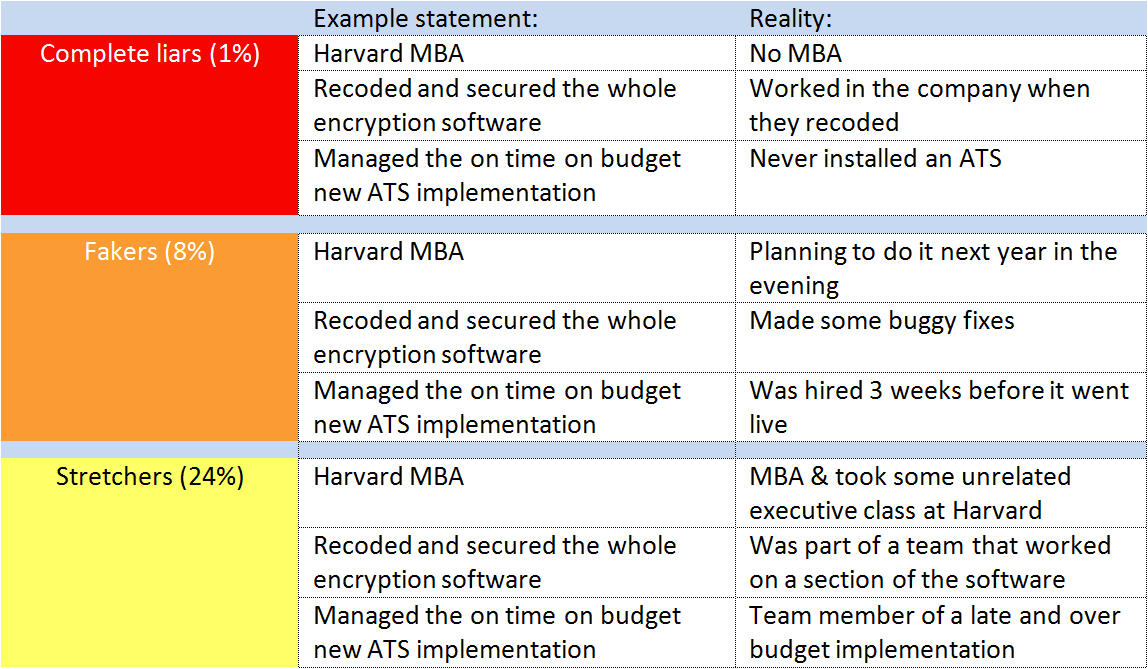How many applicants fake test results and assessments?
Does cheating work? Is it worthwhile?
What can you, the employer, do about it?
Personality Assessments
I have always been suspicious of self-rated assessments, as candidates know the job they are interviewing for and can guess what to say or not say. Many studies, such as the one recently published in the International Journal of Selection and Assessment (They Don’t Do It Often, But They Do It Well: Exploring the relationship between applicant mental abilities and faking, Julia Levashina, Frederick P. Morgeson and Michael A. Campion), have shown that self-assessments are indeed faulty:
This research [on fake personality measures] consistently demonstrates that candidates are able to fake personality measures by recognizing the correct, job-related, or preferred answers, and artificially inflate their scores.
Scary, right? Well, it depends on who is doing the cheating. Many candidates who have gone without a job for six months or more will tell you that it is good to know how to play the system in order to get a job.
Biodata Assessments
Some organizations may agree that personality tests can be faked, yet still believe in the strength of their biodata assessment. Are they correct in doing so?
First, what is biodata? Biodata is a commonly used term in industrial and organizational psychology for biographical data. Biodata is defined as “… factual kinds of questions about life and work experiences, as well as to items involving opinions, values, beliefs, and attitudes that reflect a historical perspective.” The basis of biodata’s predictive abilities is the axiom that past behavior is the best predictor of future behavior.
Biodata has an advantage over personality or even interest inventories, as it tells you the past behavior of a person, and from there it can predict one’s future actions … assuming one tells the truth!
How Many Cheat?
A newly released study from Julia Levashina, Frederick P. Morgeson, and Michael A. Campion on real candidates in real job application situations will give us the answer.
And this is a serious study, as 17,368 applications were analyzed across many different job categories (general management, economic and political analysis, public relations, etc.) with an innovative but strong way to detect the fake. Also, it is important to note that “candidates were warned that their responses could be verified and that any attempts to falsify information could be used as a basis for not employing them.” Thus, it was not a laboratory experiment.
So, how many are fakes? How many among those 17,368 applicants were trying to fake their way in?
The researchers divided the applicants into three groups, which we have taken the freedom to name:
Complete liars: 173 candidates (1%)
Fakers: 1,389 candidates (8%)
Stretchers: 4,168 (24%)
In short, a third of the people you will see will pretend to have done many more things than they actually have. In practice it could look like this:

These examples look obvious, and are for the sake of fun and illustrating the point, but they are probably what you can read on a resume or hear during an interview. Some strategies can help you uncover the hoax. We will cover them at the end. But the question still remains: Does cheating work?
Does Cheating Work?
Statements used in the research assessments were not as obvious; they were experiences or behaviors important to successful job performance. These included interactions with others, adaptability, initiative or persistence, leadership. These are less easy to fake. For instance, when you first move into a new place, how much time do you spend exploring your new surroundings (5 = a great deal of time; 1 = very little time)? They were capable of cheating, but how well did that work in favor of the fakers?
The research on this is clear: all groups of fakers “obtained higher scores on the biodata measure.”
Interestingly, the research showed that people with higher levels of mental abilities fake less often, but when they do it they get significantly higher scores. In short, the clever fakers are the ones benefiting the most.
So, we can safely predict that once job seekers learn that stretching the truth on applications and interviews works in their favor, they will continue to do it more. Thus, if today we see one in three people stretching the truth, tomorrow we may see one in two.
Talent Acquisition Response
Of course I/O psychologists will combat these statements by saying that they use empirical rating versus rational rating procedures. In short, more is not always best and other techniques prevent the fakers from winning. Incorporating other testing strategies should therefore be the first step, but it’s best to not take a chance, so I advise complementing such techniques with the following three simple and cheap strategies:
- For verifiable facts (i.e. Harvard MBA) perform a verification (academic, employment, etc). Not only will you avoid a bad hire, but you’ll prevent potential brand erosion and embarrassment.
- For results or behaviors that require one to have expertise (i.e. “recoded and secured the whole encryption software”), if straight technical assessments aren’t possible, make sure that a technical person (on your staff or outside if it is very unique) is part of the interview team to cross check the candidate to validate the expertise. At a minimum, a telephone interview or video conferencing should be performed if a face-to-face meeting is not possible.
- For results or behaviors where you can learn the jargon quickly (i.e. manage the on-time on-budget new ATS implementation), I recommend colleagues rate the candidate and or perform a reference check 2.0. These can be used as well for the previous section if you question the achievement level or the personality fit of a candidate, as technical competence is not always synonymous with performance and integration.
Armed with these tools, the next time you have three finalists in front of you, you will have the certainty of not picking the fake one.